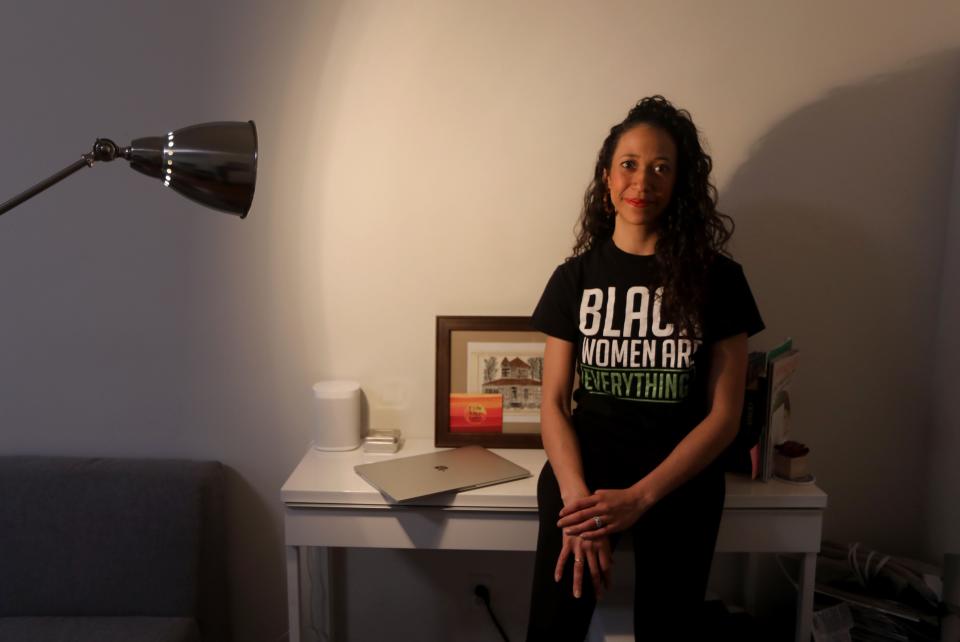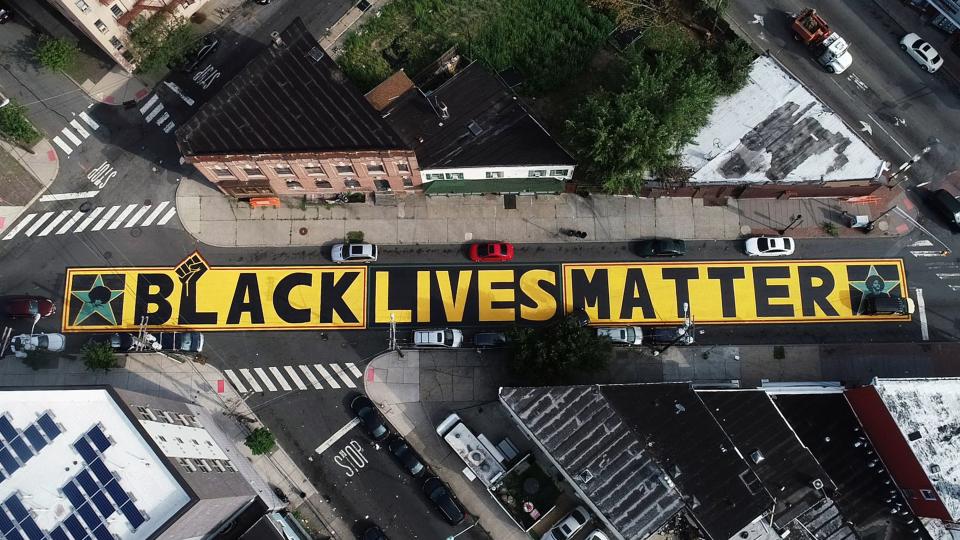'By us, for us': Project invests in Black women while corporations' 2020 promises remain unclear
Mary-Pat Hector became a community organizer as a preteen. Now 24, the Georgia-based graduate student still notices that whatever issue she campaigns around, she struggles to get investors to fund her projects. She didn't see investment in work done by Black women organizers as she got older, and wondered if funders put up more walls not only because of her age, but race and gender, too.
Hector noticed more investment in Black people since summer 2020, when the murder of George Floyd at the hands of police sparked a racial justice reckoning across the globe. But not many people were investing time or money in Black women organizers "who are making a difference in the world in different spaces and different fields," Hector said.
At the same time, Gabrielle Wyatt noticed "phenomenal Black leaders" faced burnout that felt "very different and dire" following the demand on Black activists during 2020, she said. She couldn't wait to see if companies would "put their money where their mouths are," and wanted to create a "by us, for us" approach. In 2021, she launched the Highland Project as a funnel to get dollars in Black women leaders' pockets, including Hector's.
"I kept asking myself what if my friends, what if I, no longer work in these fields as systems change to create generational opportunity? What would happen to our babies, to their babies?" Wyatt said. "I wanted to figure out how do you pair trusting capital for Black women leaders with a space that's unapologetically focused on their sustainability and well-being."
It's hard to tell where companies' dollars promised in summer 2020 went, or if internal changes occurred nearly two years later, as there isn't a central entity tracking outcomes of these commitments.
Economist William Michael Cunningham has not seen as much “intentionality around actually getting money out the door.” His consulting firm, Creative Investment Research, tracks pledges and efforts of 261 private companies that promised financial support for Black communities.
Corporations committed just over $652 million, according to Creative Investment Research’s Black Lives Matter Donation Tracker. About $1.8 billion of pledged corporate funds have been delayed or were not sent based on what Cunningham could confirm.
Wyatt has sat on both sides of the funding table, and knows that this money could be harder for Black women organizers to come by. Women and girls of color received less than 1% of $67 billion from foundations, according to a study the Ms. Foundation published in July 2020. That equates to $5.48 per woman and girl of color in the U.S.

Wyatt said hurdles Black women must go through to get support, like the amount of time needed to lobby funders, are "taxing and toxic" and "rooted in skepticism."
"What haven't [Black women leaders] been able to do because this funding environment is so complicated?" Wyatt said. "If we can see your track record of how you've led change, how you've led a budget, how you've led initiatives, we're going to enter this process in a way that asks questions not about compliance but rather what are you dreaming up?"
Highland encourages dreaming and risk-taking, something that's necessary to make sustainable change, Wyatt said. In her years working in philanthropy, she's seen white leaders get millions of dollars "with loose metrics that incent failure," but leaders of color do not get the same chances.
White-led, early stage organizations received about $20 million more in funding than new, Black-led organizations in the U.S., according to a report from Echoing Green, a nonprofit that supports social justice entrepreneurs.
Historically, the philanthropic sector has "done a lot to us, as opposed to with us, as Black people," said Colorado State Rep. Leslie Herod, another inaugural Highland leader. Highland leaders and project staff hale from across the country, with Hector in Georgia and Wyatt in New York City.
Herod has led and founded nonprofits, and knows from her experiences that few Black women hold seats at the right tables. Herod said has never seen the type of investment in Black women as the Highland Project.
Project leaders invited more than 40 organizations across the U.S. to nominate Black women leaders. From that pool, Wyatt's team selected an intentionally multi-generational first cohort of 15 Black women.
The Highland Project provides leaders with funding, similar to Black Girl Freedom Fund and Southern Black Girls and Women's Consortium. Supporting future generations of Black people rests at the core of Wyatt's mission and the efforts of Hector, who is the youngest member of the inaugural group of leaders.
Building this generational wealth for Black people defines the Black Lives Matter movement for Herod.
"The generational wealth gap that we have within our communities is not acceptable," she said. "It's the natural and right evolution of the movement that we're not just focusing on that base-level safety, but we're really looking at what we can do to grow our communities and repair the damage that's been done."
While the movement continues
As Black Lives Matter efforts remain at the forefront, stakeholders and people seeking funding want more transparency from companies who made financial and other commitments to Black Americans.
American Express, for instance, announced an "action plan" in October 2020 that included an aim to reach 100% pay equity, creating equal opportunities at all levels in the company and increasing resources to racial equality organizations.
But a year later, the shareholder advocacy nonprofit As You Sow filed a resolution urging American Express to prove changes, or at least attempts to reach these goals, by publishing data.
JUST Capital, a research nonprofit that measures corporate performance, joined corporations in their efforts to not only implement diversity initiatives, but use the “momentum" ignited in summer 2020 to create visible change.

“Because this is a bigger movement there really needs to be that idea of tracking data, looking at the promises corporations are making and really that there is accountability toward that,” said Ashley Marchand Orme, JUST Capital’s director of corporate equity.
Although Cunningham compiled the tracker, he wants more government oversight to hold corporations accountable. He petitioned the U.S. Securities and Exchange Commission to develop disclosure rules for companies that pledge financial support for BLM-related causes.
Herod will focus her Highland Project-supported efforts on this idea of investing in Black communities and building generational wealth. Her project involves rethinking housing voucher programs to "not only ensure that people can live somewhere month to month" but help people find long-term financial stability and build equity.
Hector, the Georgia organizer, will invest in the future generation of Black leaders, with support from the Highland Project. She plans to make her own investments in young organizers of color, whether that's financially or by helping a young person strategize to bring awareness to an issue.
"I want to ensure young Black organizers are being heard, because I felt unheard for so long," Hector said, reflecting on her years as a teenage organizer.
Yet, building multigenerational wealth, and supporting Black women leaders, requires more than money, said Wyatt, the Highland Project leader.
"It's about having access to great schools, access to your college ambitions without being saddled by student debt … It's about the ability to know how to estate plan and keep the wealth that you're generating for your children," she said. "We're focused on interdisciplinary solutions that can create a new definition of wealth accumulation in the Black community."
Our company’s pledge
Gannett — the owner of USA TODAY and over 260 local news outlets — followed many other U.S. companies in making public diversity promises following the racial justice reckoning of 2020.
It vowed to make the workforce reflect the country’s diversity by 2025. To hold itself accountable, Gannett plans to regularly disclose demographic data. Staff self-reported race, ethnicity and gender information last year.
The numbers revealed over half of our company identified as male, with less than 1% self-identifying as a gender outside the male-female binary. The staff was overwhelmingly white, with non-white employees making up just over a quarter of 15,508 respondents. Gannett planned to expand what demographic data it tracks by the end of 2021. Breakdowns by individual newsrooms can be found in the staff directory pages on our websites.
Gannett also promised to add 60 newsroom positions dedicated to covering race, identity, social justice and equality. As of early September 2021, Gannett created 20 national and 40 regional roles dedicated to these topics, according to Maribel Perez Wadsworth, Gannett Media’s president of news and USA TODAY publisher. Wadsworth reported Gannett hired more than a dozen journalists of color to senior leadership roles and top newsroom positions since the 2020 survey was completed.
Sammy Gibbons is a culture reporter for the USA TODAY Network's Atlantic Region How We Live team. Email: sgibbons@gannett.com | Twitter: @sammykgibbons. For unlimited access to the most important news, please subscribe or activate your digital account today.
This article originally appeared on NorthJersey.com: Project supports Black women leaders, await companies' 2020 promises

